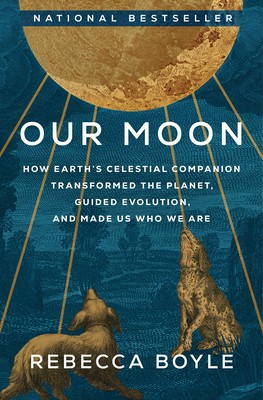
- Išsiųsime per 10–14 d.d.
- Autorius: Rebecca Boyle
- Leidėjas: Random House
- ISBN-10: 0593129725
- ISBN-13: 9780593129722
- Formatas: 16 x 23.6 x 3.3 cm, kieti viršeliai
- Kalba: Anglų
- Extra -15 % nuolaida šiai knygai su kodu: ENG15
Atsiliepimai
Aprašymas
An intimate look at the Moon and its relationship to life on Earth--from the primordial soup to the Artemis launches--from an acclaimed Scientific American and Atlantic contributor. Far from being a lifeless ornament in the sky, the Moon holds the key to some of science's central questions, and, in this fascinating account of our remarkable satellite, Rebecca Boyle shows us why it is the secret to our success. The Moon stabilizes the Earth's tilt toward the Sun, creating reliable seasons. The durability of this tilt over millennia stabilizes our climate. The Moon pulls on the ocean, driving the tides. It was these tides that mixed nutrients in the sea, enabling the evolution of complex life, and, ultimately, bringing life onto land. But the Moon also played a pivotal role in our conceptual development. While the Sun helped humans to mark daily time, hunters and gatherers used the phases of the Moon to count months and years, allowing them to situate themselves in time and plan for the future. Its role in the development of religion--Mesopotamian priests recorded the Moon's position to make predictions about the Moon god--created the earliest known empirical, scientific observation. Boyle deftly reframes the history of scientific discovery through a lunar lens, from Mesopotamia to the present day. Touching on ancient astronomers including Claudius Ptolemy; ancient philosophers from Anaxagoras to Plutarch; the scientific revolution of Copernicus, Galileo, and Kepler; and the lunar fiction of writers like Jules Verne--which inspired Wernher von Braun, the Nazi rocket scientist who succeeded in landing humans on the Moon--Boyle charts our path with the Moon from the origins of human civilization to the Apollo landings and up to the present. Even as astronauts around the world prepare to return to the Moon, opening up new frontiers of discovery, profit, and politics, Rebecca Boyle brings the Moon down to Earth for us.
EXTRA 15 % nuolaida su kodu: ENG15
Akcija baigiasi už 3d.06:03:51
Nuolaidos kodas galioja perkant nuo 10 €. Nuolaidos nesumuojamos.

- Autorius: Rebecca Boyle
- Leidėjas: Random House
- ISBN-10: 0593129725
- ISBN-13: 9780593129722
- Formatas: 16 x 23.6 x 3.3 cm, kieti viršeliai
- Kalba: Anglų Anglų
An intimate look at the Moon and its relationship to life on Earth--from the primordial soup to the Artemis launches--from an acclaimed Scientific American and Atlantic contributor. Far from being a lifeless ornament in the sky, the Moon holds the key to some of science's central questions, and, in this fascinating account of our remarkable satellite, Rebecca Boyle shows us why it is the secret to our success. The Moon stabilizes the Earth's tilt toward the Sun, creating reliable seasons. The durability of this tilt over millennia stabilizes our climate. The Moon pulls on the ocean, driving the tides. It was these tides that mixed nutrients in the sea, enabling the evolution of complex life, and, ultimately, bringing life onto land. But the Moon also played a pivotal role in our conceptual development. While the Sun helped humans to mark daily time, hunters and gatherers used the phases of the Moon to count months and years, allowing them to situate themselves in time and plan for the future. Its role in the development of religion--Mesopotamian priests recorded the Moon's position to make predictions about the Moon god--created the earliest known empirical, scientific observation. Boyle deftly reframes the history of scientific discovery through a lunar lens, from Mesopotamia to the present day. Touching on ancient astronomers including Claudius Ptolemy; ancient philosophers from Anaxagoras to Plutarch; the scientific revolution of Copernicus, Galileo, and Kepler; and the lunar fiction of writers like Jules Verne--which inspired Wernher von Braun, the Nazi rocket scientist who succeeded in landing humans on the Moon--Boyle charts our path with the Moon from the origins of human civilization to the Apollo landings and up to the present. Even as astronauts around the world prepare to return to the Moon, opening up new frontiers of discovery, profit, and politics, Rebecca Boyle brings the Moon down to Earth for us.


Atsiliepimai